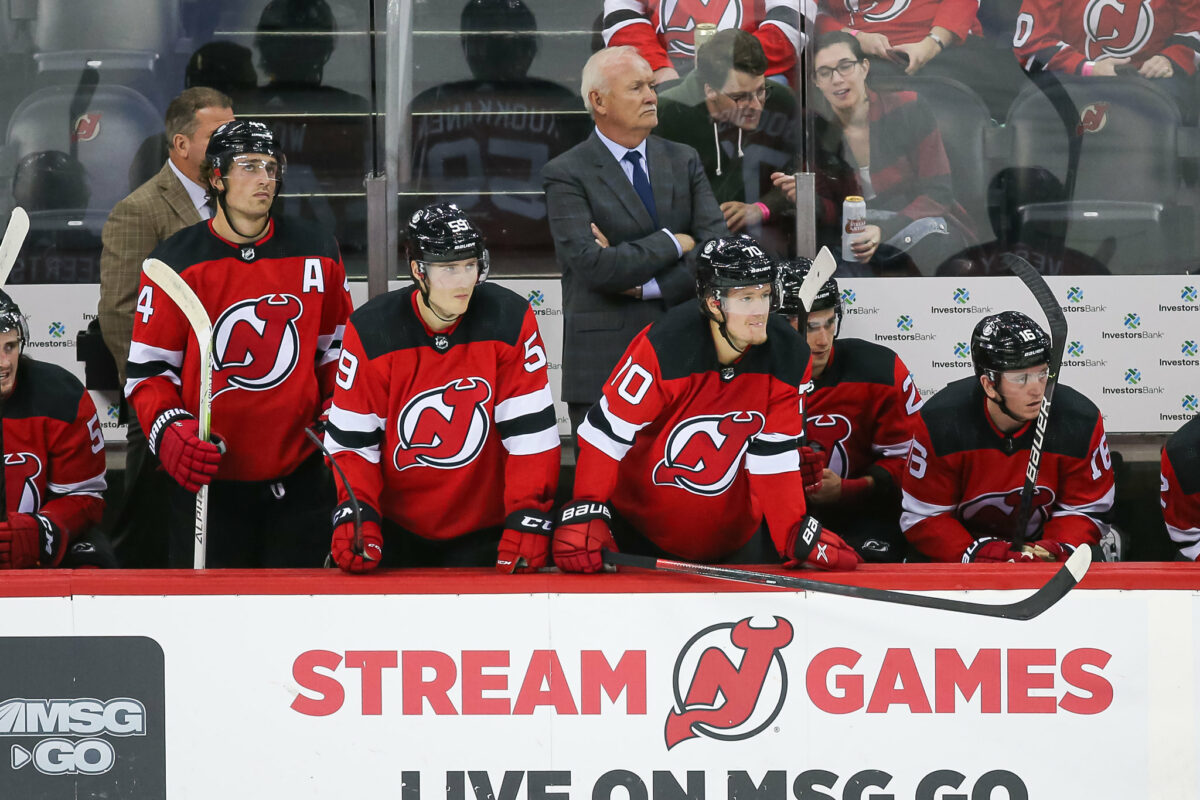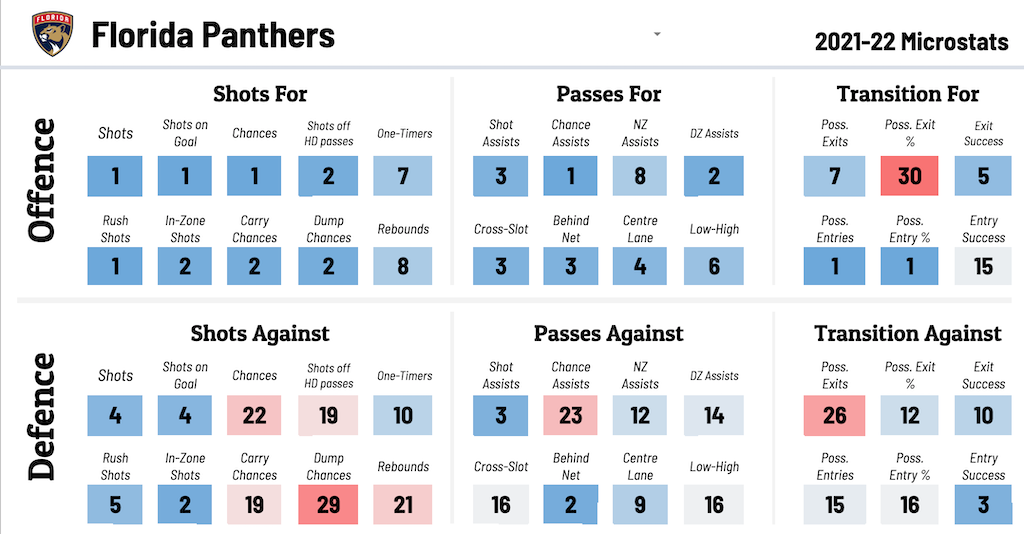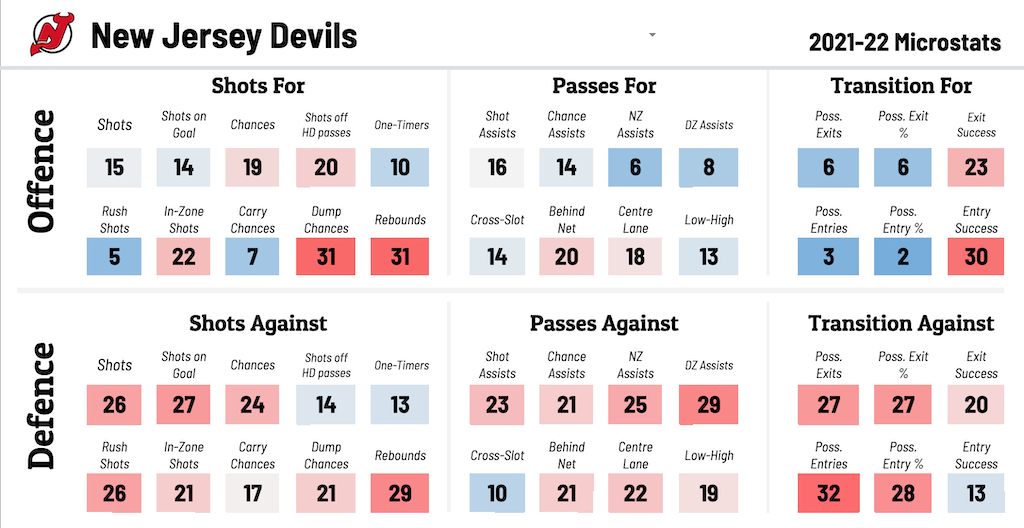The New Jersey Devils’ 2022-23 season has gotten off to a rough start. If it feels like you’re watching a re-run of a game from a season ago, you wouldn’t be wrong in that assessment. The Devils lost both of their first two contests 5-2, and while they did outplay each of their opponents for good stretches, the same mistakes that plagued them the previous two seasons have reared their ugly heads again.
Sure, the goaltending has been awful, as Mackenzie Blackwood and Vitek Vanecek have had brutal starts. But eventually, the Devils’ woes can’t fall solely on their goaltenders. Untimely defensive breakdowns are putting more stress on the team’s goalies than they should be facing. Factor in the psychological toll Devils players are dealing with after losing 94 games, overtime included, and winning 46 over the last two seasons, and head coach Lindy Ruff is running out of rope in New Jersey.
Blame Doesn’t Fall Solely on Devils Goaltending Anymore
Goaltending has been a problem for the Devils since Cory Schneider began to decline in the mid-2010s. General manager Tom Fitzgerald has addressed it in each of the last three offseasons, signing Corey Crawford in 2020, Jonathan Bernier in 2021, and acquiring Vanecek in a trade with the Washington Capitals this past summer.
Two of those acquisitions have not worked out; Crawford retired before even playing a game for the Devils, and Bernier is still working his way back from hip surgery he underwent nearly 11 months ago. Vanecek had a strong preseason, but as mentioned, his first start on Saturday night did not go well, as he gave up five goals on 1.94 expected goals.
That’s problematic and has been a common theme over the last two seasons with the team’s netminders. Devils goalies need to be better, but there eventually comes a point when the goalies aren’t the only problem. The team plays a run-and-gun system under Ruff, but they’re far from the only team to do so. The Toronto Maple Leafs, despite their playoff struggles in recent seasons, have played with pace and have had plenty of success in the regular season. The Florida Panthers won the Presidents’ Trophy playing primarily off the rush a season ago too.
The difference between those teams is their defensive structures are more sound than the Devils’. During the previous two seasons, the Maple Leafs and Panthers ranked in the top 10 in shot attempts against per 60 minutes. They were also good at preventing quality, ranking seventh and 12th in expected goals against per 60. Meanwhile, the Devils have ranked 17th in shot attempts and expected goals against per 60.

There were worse defensive teams than the Devils in the previous two seasons. But structurally, there are some things the numbers may not be catching. Take the first two games of the season, for example. Though Blackwood was at fault for the first goal he gave up against the Philadelphia Flyers on Thursday, Ryan Graves was well out of position and left Wade Allison unmarked right in front of the crease for an easy tap-in.
Take Saturday night’s game against the Detroit Red Wings. It’s a 2-2 affair, and the Devils are playing a competitive contest to this point. The Red Wings dump in what seemed like a harmless puck. Damon Severson retrieves it, but instead of sending the puck to Graves to reverse the flow of play, he pins the puck along the boards. The puck shakes loose, Vanecek misplays it, and David Perron buries it for a 3-2 Red Wings lead. Detroit didn’t look back and would win 5-2.
Related: Devils 2022-23 Home Opener: The Highs and Lows
So yes, the goaltending needs to be much better, but it’s hard to ignore the defensive breakdowns. Personnel isn’t an issue anymore, either. With a blue line consisting of Dougie Hamilton, Jonas Siegenthaler, Graves, Severson and John Marino, those are five capable top-four defenders. Defensive breakdowns should be less frequent than they are.
That seems to point to some systemic issues that the Devils have not been able to flush out over the last two seasons. Is it enough to say their system is suppressing save percentages? Scott Wedgewood put up a .912 save percentage between the Arizona Coyotes and Dallas Stars after the Devils lost him on waivers early last season. With New Jersey in 2020-21 and a few games in 2021-22, he had a .896 SV% in 19 games. It’s hard to know for sure, but it’s difficult to imagine every goalie the Devils have used over the last two-plus seasons has been as bad as their numbers indicate.
Mounting Losses Will Take a Toll on Devils
No one likes to lose, especially athletes earning millions of dollars in the most competitive hockey league in the world. The Devils have lost plenty of games the last two seasons, and while no one expected them to be competitive in 2020-21, they were expected to be a bubble team a season ago. Injuries to Blackwood and Bernier derailed those plans, so you take a mulligan and move on to a new year. But still, it leaves a mark; battle scars, so to speak.
The Devils entered this season at full strength and once again looked to have a roster capable of competing. Blackwood and Vanecek are healthy, and no position players had injuries to start the regular season. But even though they don’t have health concerns, it’s difficult to ignore that the team’s first two contests looked eerily similar to losses in the previous two seasons. It’s hard to know what goes through anyone’s head, let alone professional athletes. But Miles Wood’s comments late last week are a bit telling:
“I’m sick and tired of being on a bad team” is the part that stands out. Wood did get some flack for the comments, but he wasn’t wrong in his general thinking. The Devils have lost plenty of games while he’s been on the team, and that much losing takes its toll. Many of Wood’s teammates in previous years are still playing for the Devils. Chances are that if he feels that way, he’s far from the only Devil who feels that way. And when Perron scored, you could see the team deflate. It more or less felt like an “oh no, here we go again” moment.
That’s why if the Devils don’t right the ship soon, their 2022-23 season could snowball and spiral out of control very early and quickly. The good news is their schedule this week contains games against the Anaheim Ducks, New York Islanders and San Jose Sharks. The opportunity to right the ship is there. And with their team SV% being at a horrific .782 through two games, that has to regress positively at some point since it’s unsustainably terrible.
Related: NHLers by Country: On Top of Their Game and the World
The question is, how soon does that rebound? And can it improve to a level the Devils need (.902 or above) so they’re not sitting in the basement of the standings? I think an answer will become abundantly clear over the next week or so of games. If the same issues carry over into the new week and the Devils start the season with a 0-3-2 record or similar, management will have to make a coaching change sooner than later. It will feel like deja vu, and simply for the players’ psyches, they will need a revamped system to give them a breath of fresh air. Fortunately, the solution is already behind the bench.
Devils Have an Answer in Andrew Brunette
Though you can make an argument based on the previous two seasons that the Devils should be seriously contemplating a coaching change after only two games, they’re not going to pull the plug yet. As mentioned above, a .782 SV% is unsustainably terrible and could start rebounding as soon as tomorrow night. But if positive regression doesn’t occur and management decides to make an early coaching change, Andrew Brunette was a Jack Adams finalist a season ago and is on Ruff’s staff.
There’s a reason I mentioned the Panthers earlier in this article, and that’s because Brunette was their coach in 2021-22 for all but seven games. If he takes over behind the bench in the coming weeks, I’d expect some systemic changes. Offensively, it will look similar to what the Devils run under Ruff, meaning they will play primarily off the rush. The Panthers were one of the best rush teams in the league under Brunette last season. And once they gained the offensive zone, it was shots galore, both in quantity and quality:

Defensively is likely where Brunette would tweak things, both in the neutral and defensive zones. While the Panthers were not an elite team defensively in the neutral zone, they were generally in the top half of the NHL against defending the rush and did even rank third in entry defense, as shown in the card above.
The Devils’ card is below, but their transition defense and neutral zone play were among the worst in the NHL last season. They ranked last in possession entries against and 28th in possession entry percentage, meaning opponents didn’t have much trouble attacking off the rush through the neutral zone against the Devils, per Corey Sznajder’s data:

There’s also a lot of red in the defensive part of the Devils’ card. While they did a decent job defending high-danger chances and cross-slot passes, which reduces quality chances, their defense struggled elsewhere. They may do a good job preventing quality, but the rest of their defensive microstats track poorly. Since they give up quite a bit defensively, it’s less risk-averse, so if something breaks down, it may not take long for things to fall apart and result in a goal against, much like a chain reaction.
Compared to the Panthers’ defensive microstats, there was a noticeable difference in the two team’s defensive systems; the Panthers’ was generally tighter and involved less risk. That’s something that probably would help the Devils, especially their goaltenders. So if Brunette takes over in the coming weeks, his system would likely benefit the team.
Devils Can’t Hesitate To Make a Change
The Devils’ front office will have plenty of questions to ask themselves from the 0-2-0 start to the season, much more than mentioned here. The team has easily controlled play at five-on-five during their first two games, even with the breakdowns. But if they don’t regress positively and the losses continue to mount, they’ll have to ask themselves why and decide what to do next. They cannot afford to stand pat and risk another lost season because the talent is there to be competitive.
Based on the previous two seasons under Ruff, I have doubts that the team’s current issues resolve themselves. The same problems that plagued them in those two seasons have done them in during their first two games. The goaltending has been awful, while the rest of the miscues feel all too familiar. From a psychological standpoint, the players can’t go through this much longer, given the last two seasons. Ruff still has some rope to figure things out over the next couple of weeks, but he’s running out of thread to hang on to.
* * *
Advanced stats from Natural Stat Trick, microstats data from Corey Sznajder (@shutdownline); microstats visuals from JFresh Hockey